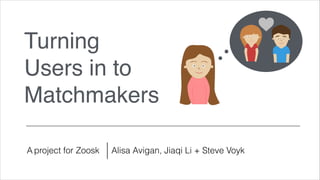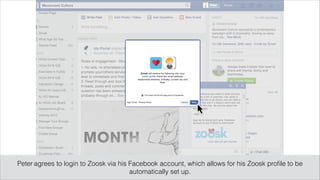Zoosk RDSC Challenge.
- 1. Turning ? Users in to ? Matchmakers A project for Zoosk Alisa Avigan, Jiaqi Li + Steve Voyk
- 2. Currently, Zoosk only helps those who want to date either for fun or for the purpose of forming a relationship. Romantic Timeline D ating N ewRelationship M ature Relationship N otD ating
- 3. How can Zoosk begin to guide its users during the other phases of the "Romantic Timeline?" Romantic Timeline D ating N ewRelationship M ature Relationship N otD ating ? ?
- 4. Our design focuses on how Zoosk can begin to service the post-dating phase of the "Romantic Timeline" to enhance users' relationships + keep couples engaged on Zoosk. Keeping Couples Engaged D ating N ewRelationship M ature Relationship N otD ating
- 5. Keeping Couples Engaged ? Many couples have friends who are single ? ... And they love setting them up! ? Why? Because they get to spread the love + happiness they're experiencing to their friends.
- 6. Keeping Couples Engaged ? Zoosk can keep couples engaged by facilitating one of their favorite activities - matchmaking! ? Our design prescribes that Zoosk enable its users to propose matches to friends.
- 7. Why this Design? For Zoosk For Users ? Keeps users in relationships engaged " ? Matchmakers can potentially draw in new Zoosk users through using Zoosk to match Facebook friends who aren't already on Zoosk. " ? A human perspective complements the behavioral matching algorithms to make more effective + trusted matches ? Users can experience the joy of setting up their friends " ? Matches proposed by friends are more trusted and valued than those proposed by an algorithm, because friends can generally learn you better than a machine " ? People prefer to date those who are within their social circles due to perceived safety + common ground
- 8. Phases of ImplementationFeasibility Impact Phase I ! Zoosk to Zoosk Phase II ! Zoosk to Facebook Phase III ! Facebook to Facebook
- 9. Phase I Zoosk to Zoosk Capabilities:! Users can match their friends and acquaintances who are already using the Zoosk platform Z Z
- 10. Phase I Scenario
- 11. Julie Matt Julie and Matt met through Zoosk. Julie thinks Matt is a good guy, but she just doesn't feel the spark.
- 12. Julie then met another guy through Zoosk and they started dating. She's really happy.
- 13. Then Julie thinks about her good friend Ashley, who is also using Zoosk now. "Ashley and Matt might like each other since they have the same sense of humor!"
- 14. So Julie goes to the "Matchmaker" tab in Zoosk. She sees all her facebook friends that use Zoosk as well as her Zoosk Connections. She selects Matt from the list.
- 15. Then she is prompted to choose who she wants to set Matt up with. She searches for her friend Ashley - who is both a Facebook friend + Zoosk user - and selects her.
- 16. She writes separate + personalized messages to both Matt and Ashley, explaining why she thinks they would make a great match! Then she sends out the matchup invitation!
- 17. Ashley + Matt both see that they have a new message in their "First Messages" tab.
- 18. After reading the message from Julie and looking at Ashley's pro?le, Matt's interest is peaked. Ashley who respects her friend Julie's opinion is interested in connecting with Matt. They both accept the invitation.
- 19. Similar to SmartPick, the chat is automatically set up only after both Ashley and Matt accept the matchup invitation. Ashley and Matt start chatting through Zoosk. Hey, Ashley. How are you doing? I'm good, Matt. How are you? Matt Ashley
- 20. Phases of ImplementationFeasibility Impact Phase I ! Zoosk to Zoosk Phase II ! Zoosk to Facebook Phase III ! Facebook to Facebook
- 21. Phase II Zoosk to Facebook Capabilities:! Users can match friends from Facebook who are not currently on Zoosk to contacts from their Zoosk network Z FB
- 23. Matt met his new girlfriend Ashley through being matched up and wants to pay it forward. He decides to match up his friend Peter who doesn't use Zoosk + has been single for a while with Emily - a girl that he used to chat with on Zoosk, who he remembers has a lot in common with Peter.
- 24. Matt goes to the "MatchMaker" tab on Zoosk and proposes a match between Peter and Emily. He selects Emily from the list.
- 25. Then he selects Peter. Even though Peter isn't on Zoosk, Matt is able to select him on the Zoosk platform, because Matt agreed to share his Facebook friendlist with Zoosk when he originally created an account. Peter
- 26. Matt writes a personal message to both Emily and Peter and then sends the match invitation!
- 27. Peter receives a facebook message from his friend Matt about potentially being matched up with Emily. Peter who has been feeling lonely lately accepts the matchup through clicking on the Zoosk link.
- 28. Peter agrees to login to Zoosk via his Facebook account, which allows for his Zoosk pro?le to be automatically set up.
- 29. After Peter's Zoosk pro?le is set up, only then does Emily receive the matchup invitation from Matt. She has good memories of chatting with Matt and therefore is open to his match suggestion. After viewing Peter's newly-created pro?le, which she ?nds appealing, she agrees to the invitation.
- 30. Emily and Peter start their romantic safari..
- 31. Phases of ImplementationFeasibility Impact Phase I ! Zoosk to Zoosk Phase II ! Zoosk to Facebook Phase III ! Facebook to Facebook
- 32. Phase III Facebook to Facebook Capabilities:! Users can match their friends from Facebook who are not currently on Zoosk to other friends on Facebook who are not currently on Zoosk. This phase grants the most freedom to Zoosk Matchmakers. FB FB * Although not designed in our presentation, should be considered in future iterations
- 33. Future Considerations ? Facebook to Facebook: Design Phase III user-?ows + wireframes " ? Incentives: Matchmakers that propose successful matches may be rewarded with romantic gifts to provide further motivation " ? Restrictions: Matchmakers should be limited by the number of matches they are allowed to propose in order to prevent users from receiving an innundation of match invitations and to encourage Matchmakers to be as thoughtful as possible with their allotted number of match invitations " ? Anonymity: Explore the possibility of match invitations where the MatchMaker is anonymous in situations where the MatchMaker feels awkward proposing a match to the involved parties " "
- 34. Leverage human-to-human matchmaking to more effectively create networks of happy couples that would want to return the favor through becoming matchmakers themselves. Draw in new users through matchmaking. Ultimate Objective
- 35. Thank You. Zoosk" Jared Crane" Tony Kennedy" Marty Siegel" Jordan Beck" HCI/d 2015


































